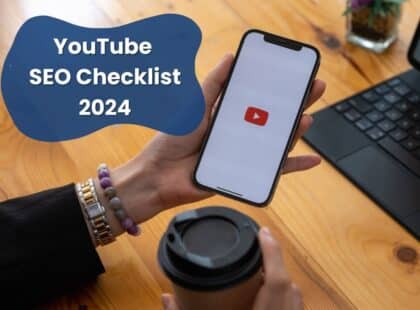
What Is YouTube SEO? 2024 YouTube SEO Checklist
In today’s fast-paced digital world, video content has become a crucial me [...]

All businesses, regardless of size, must have an online presence in the current digital era. Entrepreneurs and small businesses, in particular, need to leverage SEO in digital marketing strategies to reach their target audiences effectively. One of the most critical components of digital marketing is SEO (Search Engine Optimization). In this article, we’ll explore what SEO is, its role in digital marketing, and why it might be the right choice for your business.
Table of Contents
Digital marketing refers to all marketing efforts that use the internet or electronic devices. It’s a broad field that encompasses various channels, each with its own strengths and strategies. Understanding these channels helps businesses choose the right mix for their marketing goals.
Here are the key channels in digital marketing:
Each of these channels plays a crucial role in a digital marketing strategy, but search engine optimization in digital marketing stands out for its ability to drive long-term, sustainable growth.
SEO (Search Engine Optimization) is all about optimizing your website to make it more appealing to search engines like Google. The primary goals of SEO in digital marketing are:
More people will visit your website when it appears higher in search results. This increased visibility is crucial for attracting potential customers, especially for small businesses that need to stand out in competitive markets.
Unlike paid traffic, organic traffic refers to visitors who find your website through search engines naturally, without clicking on an ad. SEO aims to increase this type of traffic, which is often more valuable because these users are actively searching for the products or services you offer.
SEO plays a crucial role in generating organic leads by attracting visitors through non-paid search engine results. By optimizing your website, you can target users actively searching for your products or services, leading to higher-quality traffic. This targeted approach increases the likelihood of converting visitors into leads and, eventually, loyal customers. Effective SEO strategies ensure sustained business growth by continuously improving lead quality and conversion rates.
People tend to view websites with high search engine rankings as more reliable and credible. This trust can translate into higher conversion rates and long-term customer loyalty.
For entrepreneurs and small business owners, achieving these goals through SEO digital marketing can significantly impact their online presence and overall success.
SEO plays a vital role in digital marketing by enhancing your online visibility and helping you reach your target audience more effectively. Let’s delve deeper into the benefits and drawbacks of SEO:
Despite these challenges, the benefits of SEO make it a critical component of any digital marketing strategy, particularly for entrepreneurs and small businesses.
When deciding where to allocate your digital marketing budget, it’s essential to understand how SEO compares to other channels. Leveraging data from industry research can provide a clear picture of why SEO is often considered a foundational element of digital marketing strategies.
PPC advertising can quickly drive traffic to your website, but it comes at a cost. HubSpot reports that while PPC can deliver a 200% ROI, the traffic stops as soon as the budget is exhausted. In contrast, search engine optimization in digital marketing generates over 1,000% more traffic than organic social media on average. The organic traffic from SEO continues long after the initial investment, offering sustainable results without ongoing costs. For small businesses, SEO’s ability to provide lasting value makes it a more cost-effective and higher ROI option over time.
Social media marketing is effective for building brand awareness and engagement but has limited impact on driving traffic to your website. According to Growth Badger statistics, only about 10% of website traffic comes from social media, while search engines drive around 53%. This makes SEO digital marketing a more direct and effective channel for bringing users to your site. While social media fosters conversations, SEO targets high-intent users actively searching for your offerings, making it a more reliable source of conversions.
SEO and content marketing are closely connected; effective content is crucial for SEO success. Moz’s research shows that websites with strong content supported by SEO strategies get 6 times more traffic than those without. However, even the best content needs search engine optimization in digital marketing to reach the right audience. SEO ensures your content is discoverable by search engines and relevant users, which is why 70% of marketers are investing in content marketing to enhance their SEO efforts.
SEO is not just a short-term strategy; it’s a critical investment in the long-term success of your business. Data and research underline why search engine optimization is essential for sustained business growth. SEO is a powerful tool for lead generation. Studies show that companies that focus on inbound strategies (such as SEO) are 60% less expensive per lead than outbound strategies like paid ads. This cost-effectiveness makes SEO a preferred method for sustainable lead generation.
1. Sustainable Growth: SEO provides a sustainable path to growth by driving organic traffic over the long term. Unlike paid campaigns, which require ongoing investment, the results of SEO efforts can continue to accrue and even amplify over time.
Studies show that the cost per lead for SEO is 61% lower than outbound marketing tactics like cold calling or direct mail.
This makes SEO an efficient and cost-effective approach for businesses seeking sustained, long-term growth.
2. Building a Strong Online Presence: A well-optimized website doesn’t just attract traffic; it builds authority in your industry. Over time, this authority translates into higher rankings and more organic traffic.
According to Protofuze, websites on the first page of Google capture at least 71% of search traffic clicks, with the first five results accounting for 67% of all clicks.
This dominant presence is crucial for staying ahead of competitors and establishing a strong, enduring online presence.
3. High ROI: SEO offers one of the highest returns on investment among digital marketing channels. Research by Moz reveals that the ROI from SEO can outpace other forms of digital marketing, particularly when measured over the long term. This is because SEO continues to generate traffic and leads without the need for constant financial input. For small businesses, the ability to maximize their marketing budget through the high ROI offered by SEO can be a game-changer, providing a steady stream of qualified leads and customers.
SEO is a powerful tool for lead generation. Studies show that companies that focus on inbound strategies (such as SEO) are 60% less expensive per lead than outbound strategies like paid ads. This cost-effectiveness makes SEO a preferred method for sustainable lead generation.
4. Adapting to Consumer Behavior: As consumer behavior increasingly shifts towards online search, especially with the rise of mobile and voice search, having a strong SEO strategy is crucial. Google processes over 3.5 billion searches per day, and businesses that fail to prioritize SEO risk missing out on this vast pool of potential customers. For small businesses, local SEO becomes even more critical, as 46% of all Google searches are seeking local information. By optimizing for local search, businesses can ensure they are visible to consumers who are actively looking for their products or services in their immediate vicinity.
In today’s competitive digital landscape, businesses that prioritize SEO are better positioned to achieve long-term success. By focusing on SEO, you’re not just improving your website’s visibility; you’re making a strategic investment in the future growth and sustainability of your business.
For entrepreneurs and small businesses, SEO in digital marketing is more than just a buzzword—it’s a strategic investment that can provide significant long-term benefits. While SEO requires time and effort, the payoff in increased visibility, targeted traffic, and long-term credibility is well worth it.
If you’re considering whether SEO is the right move for your business, the answer is likely yes—especially if you’re looking for sustainable growth. To learn more and get personalized advice, reach out to Marketing Spotlight today for a free consultation and SEO strategy proposal. Don’t miss the opportunity to elevate your business with a strong SEO strategy!

I’ve had a smooth experience working with Marketing Spotlight team. They helped me develop a website, create a marketing strategy and set up marketing automation.

Marketing Spotlight transformed our marketing efforts with their automation services. The seamless integration and efficiency they brought to our campaigns have been a game-changer. Our customer engagement in the UAE has never been better!
The meeting link will be shared with you via email after you finish booking a call.